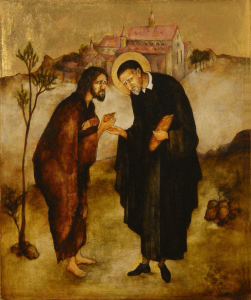 Vincent de Paul’s idea of meekness is explored in an article by Robert Maloney, C.M, former superior of the Congregation of the Mission.1 He suggests that meekness for Vincent could best be translated today as gentleness. Meekness and gentleness seem like odd things to be discussing in the current political climate. Societal advances made during the civil rights era and after were largely forged using methods we certainly would not characterize as meek.
Vincent de Paul’s idea of meekness is explored in an article by Robert Maloney, C.M, former superior of the Congregation of the Mission.1 He suggests that meekness for Vincent could best be translated today as gentleness. Meekness and gentleness seem like odd things to be discussing in the current political climate. Societal advances made during the civil rights era and after were largely forged using methods we certainly would not characterize as meek.
However, meekness and gentleness are ideas that Vincent used when talking about treating others with dignity and respect. He said to the Daughters of Charity, “[The] chief concern will be to serve…with compassion, gentleness, cordiality, respect, and devotion.”2 To serve others with respect and to recognize their human dignity is paramount in our times. Human dignity is not just a Catholic tenet. As a secular humanist, for example, I also believe treating everyone with human dignity is a precept.
Meekness or gentleness confers an openness to listen. To hear and recognize the struggle of others is a necessary precursor to work toward a solution. But that openness needs to be sincere. Listening without compassion and the willingness to work for real change is not enough. A lack of concrete action reflects the cycle we are trying to break right now—the empty nodding by government officials, the inaction that dooms us to return to the same old policies of systemic racism and systemic privilege.
I would caution you not to interpret Vincent’s conception of meekness and gentleness as weakness. Vincent never extolled the virtue of being meek to power. Gentleness in Vincent’s mind was to be accompanied by firmness. Such firmness is necessary so that the voices of people who have lost theirs can be heard. Given where we are today, it seems a good time to revisit Vincent’s idea of meekness or gentleness. His words advise that we respect all people for their inherent dignity, listen to those that have been marginalized, and stand side-by-side working in solidarity with them in their struggle for equality.
How can I be gentler and thus more open to recognizing other people’s struggles? How might I work in solidarity with others in their struggles?
————————————
- https://via.library.depaul.edu/cgi/viewcontent.cgi?article=1659&context=vincentiana
- Conference 85, Service of the Sick and Care of One’s Own Health, Common Rules, 11 November 1657, CCD, 10:267.
